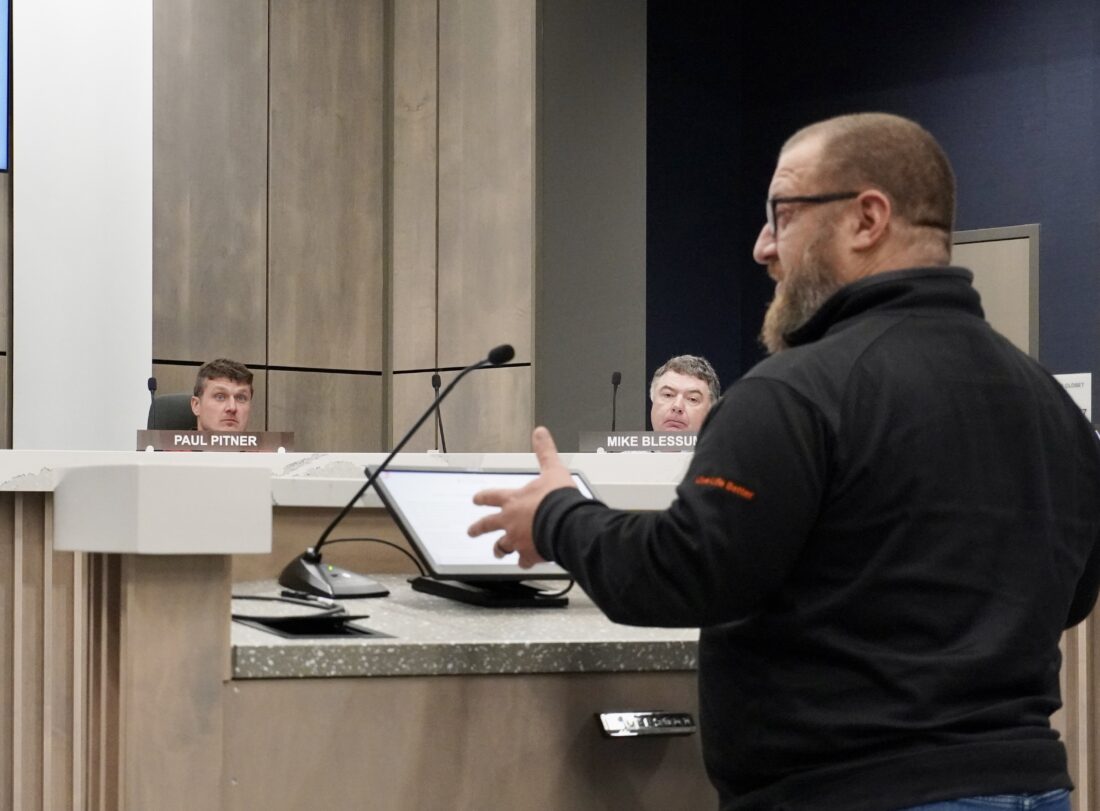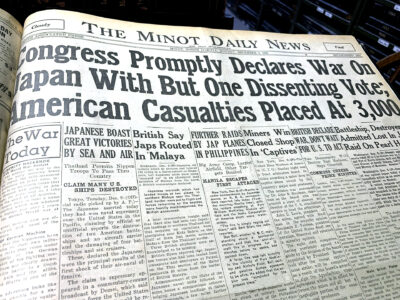City upholds liquor license cap
Alcohol ordinance rewrite continues

Jill Schramm/MDN Adam Hoffman, who owns a bar for sale, voices his thoughts on proposed changes to the city’s alcohol ordinance Monday, Oct. 20. Council members shown are Paul Pitner, left, and Mike Blessum, right.
Minot’s cap on the number of retail alcohol licenses in the city will remain in place.
The Minot City Council voted 4-3 on Monday, Oct. 20, to retain the cap after again hearing from license holders that the cap would devalue their investments.
The council has been engaged in an extended process of revising its alcohol ordinances, and the most controversial debate has been over whether to remove the population-based cap on licenses. The council had considered the topic in 2018 and elected not to make a change then as well. The city lists 31 licenses in the retail liquor license category.
“We think removing the cap would destroy substantial investment that those business owners made in good faith, cost the city millions in revenue and create the kind of regulatory instability that we think actually discourages investment in the city,” said Deb Hoffarth, an attorney representing Magic City Retail Beverage Dealers and its 14 retail liquor license holders.
“These licenses aren’t just a piece of paper. They are more than a permit. They recognize a property interest. These licenses are valuable assets that banks finance, that businesses buy and sell,” Hoffarth told the council.
Several license holders spoke at Monday’s meeting regarding the issue of the cap.
“The fact that we’re even here discussing taking off the caps on liquor licenses, it just shows a serious lack of foresight,” said Lorrie Olson with the Capri Bar. “It’s financial irresponsibility and complete recklessness. Small businesses are struggling, and workers are hard to find. Leadership should focus on stabilizing what we have, not flooding the market with more of a controlled substance.”
She added removing the caps would result in a lawsuit over the collapse of liquor license values, which have been boosted by limiting the number.
Adam Hoffman with The Original Bar, said the discussion about potentially removing the cap has created uncertainty over his license’s value and hindered his ability to sell his bar.
The committee reviewing the alcohol ordinance submitted options for removing the cap that attempted to address the loss of value, although license holders had concerns about the effectiveness.
“I am a proponent of getting rid of the caps,” council member Mike Blessum said, citing the need to give entrepreneurs freedom to compete. “To me, this is a basic fairness issue.”
Council member Rob Fuller, who made the motion to retain the cap, said he understands the fairness issue.
“But in this case, we made a promise to these people when we sold them that liquor license, that your value will stay there because we’re going to continue to maintain,” he said. Fuller added three licensed businesses are for sale and another license is expected to become available, indicating the cap isn’t restricting business opportunity.
“We’re trying to fix a problem that isn’t a problem,” he said.
“The only way to lift the caps and right that wrong – and it might be a wrong. I’m not sure. But the only way to right that wrong is to pay them for what those licenses are worth, and that is taking tax dollars to do that, and I refuse to do it,” council member Lisa Olson said.
“I do think, though, that it is a wrong,” Blessum said. “The way to rectify that wrong is to fix it and then take care of those that are impacted by it.”
Council member Paul Pitner also supported lifting the cap, favoring an option proposed by alcohol ordinance committee member Kevin Black. The option places a guaranteed value on a license and requires potential buyers to first seek to purchase from an existing license holder.
“I’m going to try to maintain the most pro-growth, pro-entrepreneurship, free market policy. And I believe going the direction of the Black proposal maintains that value for anyone that holds a license but allows someone with an idea to take the same risk that these individuals took when they decided to open their business – a large upfront cost with the opportunity to fail or succeed,” Pitner said.
Council member Mike Hayes also agreed with the Black proposal, although he asked that the council first deal with separating off-sale from retail licenses before voting on the cap. An amendment to do so failed 2-5, with support only from Hayes and Fuller.
The motion to keep the cap passed 4-3 with Fuller, Olson, Samuelson and Mayor Mark Janzter in support and Blessum, Pitner and Hayes dissenting.
License holders also had reservations about other aspects of the alcohol ordinance rewrite draft.
The council took no action but provided guidance to city staff related to additional changes it would like included in the draft, such as adding back language related to supper clubs having seating for 150 customers. Some council members took issue with removing the seating requirement and stating only that establishments sell as much food as alcohol and stop selling alcohol within an hour of the kitchen closing. Fuller referred to the result as a back door to a retail alcohol license. Blessum said it would open up every fast food place to supper club eligibility.
The council also asked staff to propose a consolidation of license types to reduce the number of categories.
Melissa Wright, with Arny’s 2.0, raised concern about the overhauling of the ordinances and urged council members to visit with license holders before making any changes.
“You are dealing with people’s lives, not just ours, but future people that are coming into this community,” she said. “Please put a halt to the rush to change this ordinance. Right now, we don’t need the changes.”


